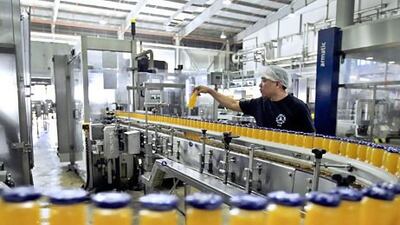Across the Arabian Gulf, Ramadan is marked by family gatherings, bountiful iftar feasts featuring spit-roasted lamb, dates, lentil soup and the tinkling of ice on glass.
Such banquets would not be complete without a fruity soft drink called Vimto.
The ruby-coloured cordial "is something we've grown up with", says Khalifa Haroon, 28, the head of interactive and innovation for Vodafone Qatar in Doha.
"I remember you'd actually hear the Vimto coming because it's poured into a glass jug filled with ice. When you hear the ice clinking, it's Vimto time."
Vimto time has helped to make Adel Aujan, 66, the Saudi businessman who controls the brand in the region, a billionaire. The chairman of Aujan Industries in Saudi Arabia, the Middle East's largest independent beverage company, has a net worth of at least US$1.3 billion (Dh4.77bn), according to the Bloomberg Billionaires Index.
Sales of the closely held Aujan Industries' three brands, Vimto, a juice drink called Rani and Barbican, a non-alcoholic malt beverage, will have exceeded $1bn for last year, according to the company - quadruple its revenue in 2004.
Aujan beverages are sold in 70 countries, with more than 70 per cent of revenue coming from the Gulf, Iran and Iraq. About half of Vimto's annual sales are generated during Ramadan, according to the brand's local website.
In December 2011, Coca-Cola bought about half of Aujan for $980 million. The deal was the biggest consumer-goods investment made by a multinational company in the Middle East, Bloomberg data showed. Mr Aujan and his family retained the remaining half, as well as a manufacturing facility based in Iran that was not included in the transaction.
"Adel Aujan has long had a vision of nurturing people and he has created an inspirational portfolio of brands," says Ahmet Bozer, the president of the Eurasia and Africa Group for Coca-Cola.
"The portfolio certainly makes this partnership attractive, but Aujan has a great leadership team and great people committed to growth and sustainability."
The company owes much of its sales surge over the past decade to regional advertising, says Thorsten Hartmann, the director of research at Imes Consulting Group in Dubai.
Since 2005, the company has flooded televisions, billboards and radios from Morocco to Iran with advertisements featuring photogenic youth and quirky mascots touting Aujan drinks.
A recent TV commercial stars a group of young men cavorting around Dubai in a vintage convertible, rapping in Arabic about "how they roll", to a punchy, hip-hop beat, Barbican bottles in hand.The company's sales may receive some extra fizz soon as government spending across the Middle East increases.
"Aujan Industries is nothing but a rare success story in the Middle East, of which I am very proud," says Mr Aujan. "We concentrated on brand building rather than general beverage trading, which I believe has brought us our success today."
Mr Aujan shares the company with his two brothers, Adnan and Abdulwahab, and is the family's controlling shareholder, says Ajith Henry and Liam Turner, spokesmen for the chairman at Burson-Marsteller in Dubai.
In a property portfolio worth about $80m, Mr Ajun owns two safari camps in Zimbabwe. In 1996, he founded the 32-square-kilometre Victoria Falls Private Game Reserve that is home to 25 different species of large game, a rhino-breeding programme and an anti-poaching academy.
The beverage maker's roots date to 1905, when Mr Aujan's father and three uncles founded Abdulla Aujan & Brothers, which traded commodities such as tobacco and rice. In 1928, the group expanded into beverages when it acquired the exclusive rights to import and distribute the original Vimto drink, a non-carbonated cordial that was invented in the United Kingdom in 1908.
Mr Aujan joined the family business in 1968, after studying in the United States at Fort Lewis College in Colorado. Unlike many family owned businesses in the Gulf that diversify into multiple industries, Mr Aujan kept the company focused on beverages.
He first expanded the company's sales and distribution networks beyond Saudi Arabia, then helped to create Vimto Carbonated, a fizzy version of the original British drink.
It took Mr Aujan almost two decades to develop the company's first original product, the Rani Orange Float, which was inspired by a mandarin drink he had tasted on a trip to Japan.
Introduced in 1982, Rani juices come in 10 flavours, feature floating bits of fruit pulp, and have become so popular that locals use the word "rani" to refer to any beverage laced with particulates.
In 2011, Rani accounted for 84 per cent of Aujan's sales, the company said.
"It's true brand innovation," says Mr Hartmann. "It's become a product type rather than a product, like Kleenex."
In 1983, Aujan began importing the non-alcoholic beer brand Barbican from its producer Bass Beers in the UK. In 1999, after manufacturing changes at Bass caused disruptions in Aujan's regular supply of the beer, the company acquired the brand for limited markets and, in 2010, bought it outright. Barbican is now produced in Mr Aujan's factory in Dubai.
Kenneth Shea, a beverage industry analyst with Bloomberg Industries in Princeton, New Jersey, says Coca-Cola's stake in the company will widen that influence further. "Coke likes to establish a relationship with the leading regional player," he says. "What this deal will likely do is help Coke distribute its own products within Aujan's distribution market. They'll also learn about the market from the market leader."
Coca-Cola's sales by volume in the Middle East region was 19 per cent higher in the first nine months of last year than the same period a year earlier, according to the company's third-quarter earnings report. In October 2011, the company said it planned to spend $5bn in the Middle East and North Africa over the next 10 years.
"The recent Coca-Cola deal recognises in monetary terms all the hard work that was put into the company over the last 100 years," says Mr Aujan.
"Our brands have stood the test of time for decades."
* with Bloomberg News

